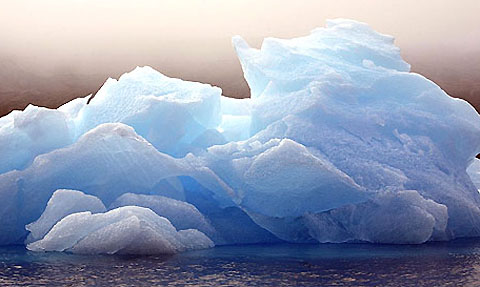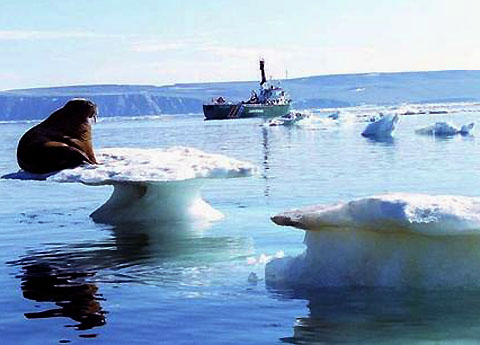SUBJECT: GLOBAL WARMING & CLIMATE CHANGE
SOURCE: DAVID WARD sayjaz3@hotmail.com
POSTED: 25 OCTOBER 2007 - 7:45am HST
Carbon output rising faster than forecast

image above: an iceberg off Ammassalik island, Greenland. Photograph: John McConnico/AP
| by David Adam on 23 October 2007 in The Guardian Scientists warned last night that global warming will be "stronger than expected and sooner than expected", after a new analysis showed carbon dioxide is accumulating in the atmosphere much faster than predicted. Experts said that the rise was due to soaring economic development in China, and a reduction in the amount of carbon pollution soaked up by the world's land and oceans. It also means human emissions will have to be cut more sharply than predicted to avoid the likely effects. Corinne Le Quere, a climate expert at the University of East Anglia and British Antarctic Survey, who helped conduct the study, said: "It's bad news because the increase in atmospheric carbon dioxide has accelerated since 2000 in a way we did not expect. My biggest worry is people are discouraged by this and do nothing. I hope political leaders will act on this, because we need to do something fast." The study worsens even the gloomy predictions of this year's report from the Intergovernmental Panel on Climate Change. The IPCC, which shared the Nobel peace prize this month with Al Gore, said there were only eight years left to prevent the worst effects of global warming, by acting to curb emissions. Dr Le Quere said: "We are emitting far more than anticipated when the IPCC scenarios were drawn up in the late 1990s." Global carbon dioxide emissions from fossil fuel burning has risen by an average 2.9% each year since 2000. During the 1990s the annual rise was 0.7%. The new study explains abnormally high carbon dioxide measurements highlighted by the Guardian in January. At the time, scientists were puzzled why dozens of measuring stations across the world were showing a CO2 spike for 2006, the fourth year in the last five to show a sharp increase in the greenhouse gas. Carbon dioxide concentration in the atmosphere is measured in parts per million (ppm); from 1970 to 2000, the concentration rose by about 1.5ppm each year; since 2000 the annual rise has leapt to an average 1.9ppm. The new study, published in the US journal Proceedings of the National Academy of Sciences (PNAS), says three processes have contributed to this increase: growth in the world economy, heavy use of coal in China, and a weakening of natural "sinks" - forests, seas and soils that absorb carbon. Pep Canadell, executive director of the Global Carbon Project, which carried out the research, said: "In addition to the growth of global population and wealth, we now know that significant contributions to the growth of atmospheric CO2 arise from the slowdown of natural sinks and the halt to improvements in the carbon intensity of wealth production." The overall growth of the economy is the only one of the three factors accounted for in scientists' forecasts of climate change, which means the growth in atmospheric CO2 is about 35% larger than they expected. About half of this is due to the Chinese reliance on coal, which has forced up the carbon intensity of the overall world economy since 2000, reversing a trend of increasing energy efficiency since the 1970s. The rest of the rise is explained by the weakening of the natural carbon sinks. Scientists assume about half of human carbon emissions are reabsorbed into the environment, but computer models predict increased temperatures will reduce this effect. The PNAS report is the most convincing evidence so far that the global sinks have weakened over the last 50 years, though the large natural variations in carbon exchange between the earth and the atmosphere mean the team can be only 89% certain they have found an effect, short of the usual 95% confidence required to publish scientific findings. |
SUBJECT: GLOBAL WARMING & CLIMATE CHANGE
SOURCE: JOHN KUNISH spiritedmassage@msn.com
POSTED: 9 SEPTEMBER 2007 - 8:00am HST
Loss of Arctic ice leaves experts stunned

image above: A walrus basks in the sun on the Chukchi Sea, between Alaska and Russia.
by David Adam on 4 September 2007 in The Guardian |
click at right to comment Island Breath Blog
you may have to look through blog archive for dated articles